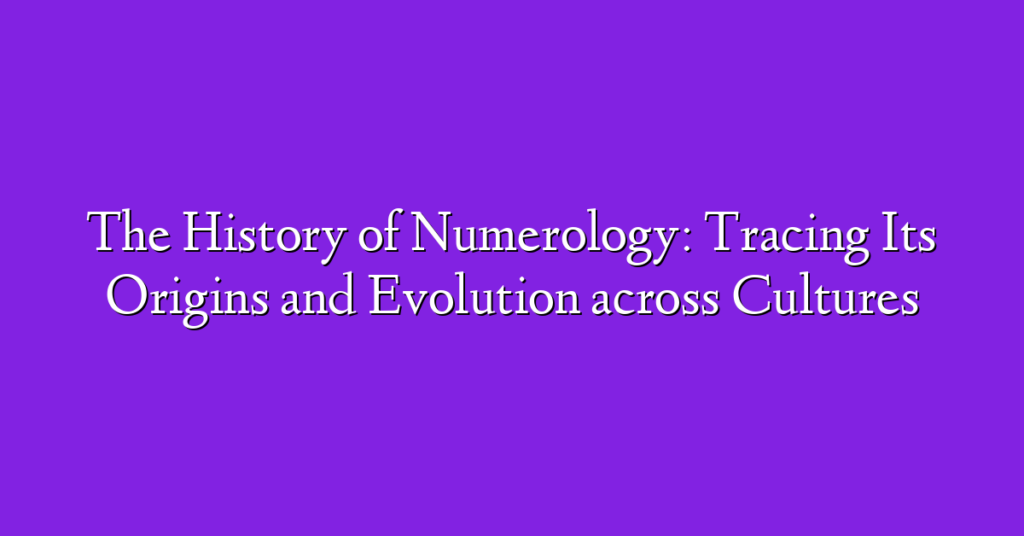Numerology, an ancient and fascinating practice, has captivated individuals across cultures and civilizations for centuries. It is the belief in the mystical and symbolic significance of numbers and their influence on human life. The origins of numerology can be traced back to the earliest civilizations, where numbers held profound cultural, religious, and metaphysical meanings. Let us embark on a journey through time to explore the history and evolution of numerology, unraveling its roots in various cultures and its enduring relevance today.
Ancient Beginnings
Numerology finds its origins in the ancient civilizations of Mesopotamia, Egypt, China, and India. These cultures recognized the inherent power of numbers and their connection to the cosmos. The Mesopotamians, credited with the development of one of the earliest number systems, believed that numbers were expressions of divine energy and used them for divination and predicting future events.
In Egypt, the study of numerology was intricately linked to their religious beliefs and cosmology. The Egyptians associated specific meanings with numbers, attributing them to the gods and using them for practical and spiritual purposes. The renowned Egyptian Book of the Dead contains numerous references to the symbolism of numbers, showcasing their importance in the afterlife journey.
Meanwhile, in ancient China, numerology was integrated into various aspects of life, including medicine, architecture, and philosophy. The Chinese believed that numbers possessed yin and yang energies, and by understanding their interplay, one could achieve harmony and balance in different areas of life.
In India, the birthplace of Vedic numerology, numbers were considered sacred and had deep metaphysical significance. The ancient texts of the Vedas contained intricate mathematical and philosophical systems that connected numbers with cosmic forces and spiritual enlightenment.
Pythagoras and the Western Influence
One of the most influential figures in the development of numerology was the ancient Greek philosopher and mathematician, Pythagoras. Born in the 6th century BCE, Pythagoras believed that numbers were the building blocks of the universe and held profound metaphysical properties. He introduced the concept of numerology as a comprehensive system, encompassing both the physical and spiritual realms.
Pythagoras assigned numerical values to letters, forming the basis of what is now known as the Pythagorean numerology system. According to Pythagorean beliefs, each number possessed its own vibrational frequency and symbolism, offering insights into the nature of the universe and individual lives.
The Pythagorean numerology system gained popularity in ancient Greece and later spread throughout the Roman Empire. It influenced various aspects of Western thought, including philosophy, mathematics, and spirituality. The works of influential philosophers like Plato and Aristotle further integrated numerology into the Western intellectual tradition.
The Influence of the Kabbalah
Another significant branch of numerology emerged from Jewish mysticism, specifically from the Kabbalah, a mystical interpretation of the Hebrew Bible. The Kabbalah assigned deep significance to the Hebrew alphabet and its corresponding numerical values, known as gematria. Through gematria, Kabbalists sought hidden meanings in religious texts, connecting words and concepts through their numerical equivalents.
Kabbalistic numerology, also known as Hebrew numerology, offered a unique perspective on the power of numbers. It became an integral part of Jewish mysticism, with practitioners using numerological calculations to gain insights into divine wisdom, spiritual growth, and personal transformation.
Modern Numerology Systems
Over time, numerology continued to evolve and adapt to different cultures and belief systems. In the 19th and 20th centuries, several influential figures contributed to the development of modern numerology systems
One notable figure is Dr. Julia Seton, an American author and metaphysician who popularized numerology in the early 20th century. Seton emphasized the psychological aspects of numerology, exploring how numbers could provide insights into an individual’s personality, motivations, and life path.
Another influential figure is Dr. Hans Decoz, a contemporary numerologist who developed the Decoz numerology system. Based on Pythagorean principles, Decoz’s system incorporates the birth name and birth date to calculate various numerological aspects, offering comprehensive readings and guidance.
Today, numerology has gained widespread popularity and acceptance as a tool for self-discovery, personal growth, and understanding the energetic influences surrounding individuals. It has expanded to encompass various numerology systems, including Pythagorean, Chaldean, and Kabbalistic numerology, each offering its unique perspectives and calculations.
The Enduring Relevance of Numerology
Despite the passage of time, numerology remains relevant in contemporary society. People from all walks of life turn to numerology to gain insights into their personalities, relationships, career paths, and life purpose. Numerological readings provide individuals with a framework to understand their strengths, challenges, and potential opportunities for growth.
Numerology’s enduring appeal lies in its ability to bridge the gap between the seen and unseen, the tangible and intangible. It offers a language of symbolism and energy, allowing individuals to tap into the hidden meanings and dynamics that shape their lives.
The Ancient Beginnings: Egypt and Babylonia
Numerology is a fascinating field that explores the mystical significance and symbolism of numbers. It is believed to have ancient origins and has evolved across various cultures throughout history. In this article, we will delve into the captivating history of numerology, tracing its origins and development across different civilizations. From ancient Egypt to modern-day practices, we will uncover the secrets and cultural influences that have shaped numerology into what it is today.
Egypt: The Birthplace of Numerology
In ancient Egypt, numerology was deeply intertwined with their religious and spiritual beliefs. The Egyptians assigned numerical values to different gods and goddesses, as they believed that numbers held divine powers. Numerology played a crucial role in their daily lives, guiding their decisions and rituals.
Babylonia: The Early Developments
Babylonians were also fascinated by numbers and their meanings. They developed a complex system known as the Chaldean numerology, which assigned specific numerical values to letters. This system laid the foundation for future numerological practices.
The Influence of Pythagoras: The Birth of Modern Numerology
Pythagoras: The Greek Mathematician and Philosopher
Pythagoras, the renowned Greek mathematician and philosopher, is often credited with formalizing numerology into a comprehensive system. He believed that numbers held great significance and that they governed the universe’s harmony and order.
Pythagorean Numerology: The Basics
Pythagorean numerology, also known as Western numerology, is based on the belief that each number has a unique vibration and meaning. It assigns numerical values to letters in a person’s name and date of birth to reveal insights into their personality, strengths, and life path. Like Life path number, master number, name numerology number, soul urge number etc.
Numerology across Cultures
Chinese Numerology: The Power of Numbers
Chinese numerology, or “Feng Shui,” is deeply ingrained in Chinese culture and has been practiced for thousands of years. It focuses on the interpretation of numbers and their impact on various aspects of life, such as relationships, career, and health.
Indian Numerology: The Influence of Vedic Traditions
In India, numerology has its roots in Vedic traditions. It is believed that each number carries specific vibrations and energies that can influence a person’s destiny. Indian numerology, also known as Vedic numerology, is often used in conjunction with astrology to gain deeper insights into one’s life path.
Numerology in the West: Modern Interpretations
In the Western world, numerology has evolved into various forms, incorporating elements from different cultures and belief systems. Modern practitioners use numerology to gain self-awareness, make decisions, and understand the energetic vibrations surrounding them.
Frequently Asked Questions (FAQs)
What is numerology?
Numerology is a metaphysical system that ascribes meanings to numbers and their influence on human life. It explores the connections between numbers, symbols, and cosmic energies.
How does numerology work?
Numerology assigns numerical values to letters and numbers derived from a person’s name and birth date. These values are then interpreted to reveal insights about their personality traits, life path, and potential challenges.
Can numerology predict the future?
Numerology is not intended to predict specific future events. Instead, it provides guidance and insights into an individual’s strengths, weaknesses, and life patterns, helping them make informed choices.
Is numerology considered a science?
Numerology is not recognized as a science in the traditional sense. It is a metaphysical practice based on symbolic interpretations of numbers and their vibrations.
Can numerology help with decision-making?
Numerology can be a valuable tool for decision-making by providing insights into a person’s strengths and weaknesses. It can help individuals align their choices with their inherent abilities and life purpose.
Is numerology a form of divination?
While numerology shares some similarities with divination practices, it is primarily focused on self-discovery, personal growth, and understanding the energetic influences surrounding individuals.
Conclusion
The history of numerology is a captivating journey that spans across ancient civilizations and modern-day interpretations. From its roots in ancient Egypt and Babylonia to the influence of Pythagoras and the diverse practices in different cultures, numerology continues to intrigue and offer valuable insights into our lives. Whether you believe in the mystical power of numbers or simply enjoy exploring the hidden meanings behind them, numerology remains a fascinating field worth exploring.
the history and origins of numerology reveal its deep roots in various cultures and civilizations. From the ancient civilizations of Mesopotamia and Egypt to the philosophical inquiries of Pythagoras and the mystical teachings of the Kabbalah, numerology has evolved and adapted throughout the ages. Today, numerology continues to empower individuals on their paths of self-discovery and personal growth, unlocking the mysteries of numbers and their profound influence on our lives.
Disclaimer: Numerology is a belief system and should be approached with an open mind. Its interpretations and insights are subjective and may vary from person to person.



